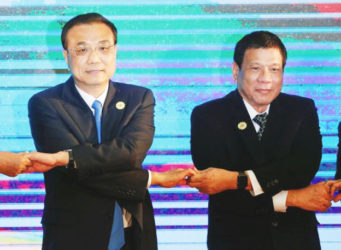VIENTIANE, (Reuters) – The Philippines said yesterday it was “gravely concerned” that Chinese boats were preparing to build structures at a disputed shoal in the South China Sea, shattering an appearance of cordiality at an Asian summit in Laos.
Officials said talks between Southeast Asian leaders and Chinese Premier Li Keqiang went smoothly. There was no reference to a July ruling by a court in The Hague that declared illegal some of China’s artificial islands and invalidated its claims to almost the entire waterway.
But, hours before the meeting, the Philippines’ defence ministry released photographs and a map showing what it said was an increased number of Chinese vessels near Scarborough Shoal, which China seized after a standoff in 2012.

“We believe that this is a precursor to possible building of structures on the shoal,” spokesman Arsenio Andolong said in Manila, adding that a denial by China’s ambassador was “even more disturbing.”
“We are gravely concerned,” he said.
China said there had been no change in the situation around the shoal and it had not taken any new action there. Chinese Foreign Ministry spokeswoman Hua Chunying told a daily briefing in Beijing that “some people” were spreading information that was “hyping the situation”.
China’s embassy in Manila said in a statement on Wednesday that there had been no dredging or building at the shoal and China had maintained a coastguard presence there for law enforcement patrols.
China, Taiwan, the Philippines, Vietnam, Malaysia and Brunei claim parts or all of the South China Sea, making it a hot spot of regional tension.
China has over the past year alarmed other claimants, and outside powers such as the United States and Japan, by re-claiming land on several disputed reefs through dredging, and building air fields and port facilities.
A Philippines official said the release of the pictures and a map showing the ships’ positions was ordered by the defence minister, who was at the Association of South East Asian Nations (ASEAN) summit in Vientiane.
But there was no row over the issue at the summit.
“It seems that every country played down the level of conflict, therefore the tone of the meeting was quite friendly and emphasised peace and security within the region,” said Weerachon Sukhondhapatipak, a Thai government spokesman.
The Philippines’ expression of concern comes after a dispute with the United States, its former colonial power. Ties turned frosty when Philippine President Rodrigo Duterte insulted U.S. counterpart Barack Obama on Monday, prompting the cancellation of a meeting between them.
They made some steps towards clearing the air late on Wednesday, however, chatting briefly, and exchanging pleasantries as they prepared to take their seats at a leaders’ dinner.
“It all springs from the fact that the relationship between the Philippines and the United States is firm, very strong,” Philippines’ foreign minister, Perfecto Yasay, said of their meeting.
The United States has been a staunch ally of the Philippines and China has repeatedly blamed Washington for stirring up trouble in the South China Sea, through which more than $5 trillion of trade moves annually.
The United States says it has no position on the territorial disputes but wants to ensure freedom of navigation.
With that in mind, it has conducted patrols close to Chinese-held islands, to Beijing’s anger, while China has been bolstering its military presence in the sea.
Although the Scarborough Shoal is merely a few rocks poking above the sea, it is important to the Philippines because of the fish stocks in the area. Manila says China’s blockade of the shoal is a violation of international law.
The dispute has become more significant since the Permanent Court of Arbitration ruled in July that no country had sovereign rights over activity at Scarborough Shoal. China has refused to recognise the ruling by the court in The Hague.
Duterte wants China to abide by the ruling and stuck to his promise not to raise the issue during the meeting in Laos.
An ASEAN communique on Wednesday listed eight points related to the South China Sea, but made no mention of the arbitration ruling.
The bloc traditionally shies away from taking a position on thorny diplomatic issues, especially where China is concerned, because of its influence in the region.

